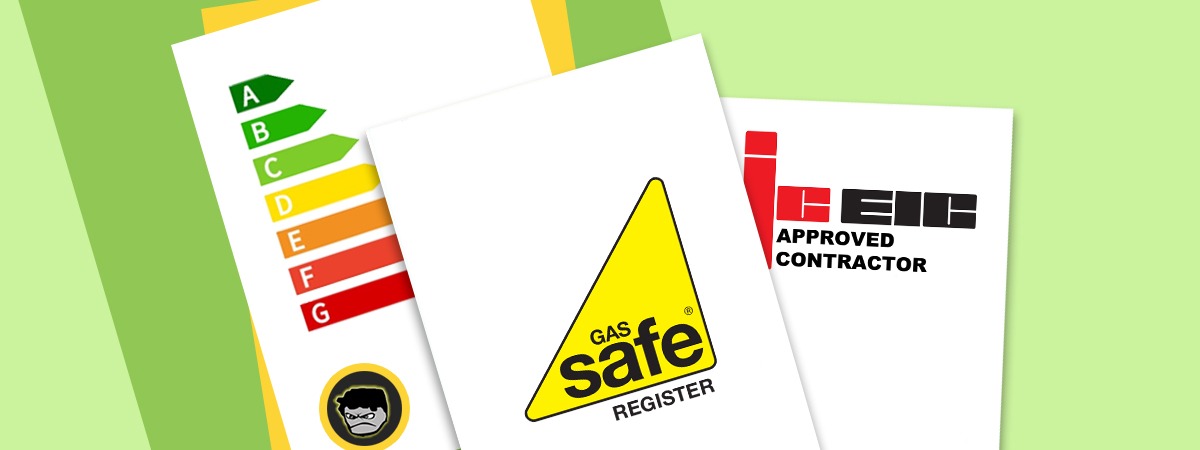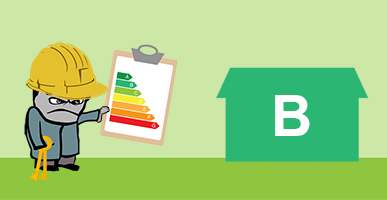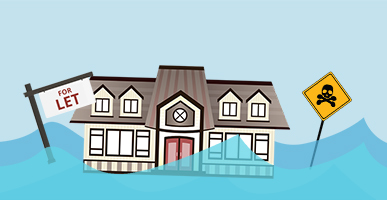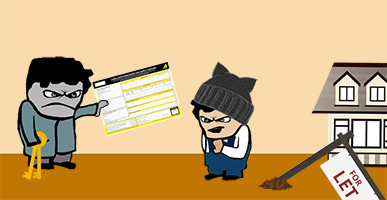
Understandably, there’s a buttload of confusion among landlords – especially new landlords – when it comes to Buy-to-let compliance, most notably which health & safety certificates are required by law.
So I’m going to try and make it easy for you.
Below is a list of legally required health & safety certificates landlords in England & Wales with an assured shorthold tenancy (AST) are responsible for acquiring for their residential rental property.
Just to clarify:
- I’m only listing the required health & safety certificates – so this is not an in-depth overview of all your legal obligations, including other bits of paperwork. You will almost certainly have other legally required obligations you will need to comply with (e.g. tenancy deposit legislation, issuing right-to-rent booklet… etc).
- This list only applies to private residential rental properties in England & Wales.
We good? Cool.
| Certificate | England | Wales | ||
|---|---|---|---|---|
Energy Performance Certificate (EPC)Since October 2008, private Residential Landlords in England & Wales have been required to show prospective tenants with an EPC (as in, before the tenant signs a tenancy agreement). An EPC report shows how energy efficient a property is with a rating between A to G (A being the most efficient, and G being the least efficient). An EPC is valid for 10 years, so there is no need to renew it for every new tenant. | England | Wales | From only£59Inc VAT | |
Gas Safety Certificate (CP12)Landlords in England & Wales are required to conduct an annual gas safety check by a qualified Gas Safe registered engineer. Once an inspection is complete, a certificate will be issued Landlords should provide a copy of the certificate to their tenants within 28 days of the gas safety check. | England | Wales | From only£45Inc VAT | |
Electrical Safety Certificate (EICR)Since April 2021, all private rented properties in England have been required to conduct an electrical safety inspection. Once an inspection is complete, a report (Electrical Installation Condition Reports (EICRs)) will be issued. A copy of the report should be provided to tenants at the beginning of the tenancy. An electrical safety inspection should be conducted at least every 5 years. | England | Wales | From only£159Inc VAT | |
Legionella Risk AssessmentLegionella must be managed appropriately in rental properties due to the danger it poses. Landlords should ensure that, at a minimum, a legionella risk assessment is completed for each property to identify any potential risks from legionella growth. It is recommended that a Legionella Risk Assessment is conducted every two years or before the start of a new tenancy. The assessment can be conducted by anyone as long as they have the relevant skills to implement the control measures and strategies, or one can be conducted by a professional assessor. While a “certificate” is not required per’se, landlords must have evidence to show that a risk assessment has taken place, and records showing what precautions were taken. | England | Wales | From only£119Inc VAT |
Yup, that’s it.
Needless to say, compliance is not only critical for the safety and comfort of your tenants, but also, failing to comply can lead to hefty penalties.
FAQ: Landlord Health & Safety Certificates
- How much do landlord safety certificates cost?
- Are there any other documents landlords need?
- Are landlords or letting agents responsible for Health & Safety?
- What’s the best way for landlord’s to keep up-to-date with Health & Safety regulations?
- How often do landlords need to renew Health & Safety certificates?
- Does it matter where I get my landlord certificates from?
How much do landlord safety certificates cost?
You may have noticed that prices can vary drastically for each respective certificate, and it’s not really reflective of the service – you’ll ultimately get the same thing at the end of it. For example, I’ve seen EPCs range from £35 to £120.
Buying landlord certificates is like buying most other products – you can shop around for the best deals.
I’ve found that online suppliers (like the one’s I have linked to) provide the most competitive rates and that’s because they work with a network of suppliers and benefit from economies of scales. Sourcing local tradesmen is usually the more expensive option. Although, understandably, many landlords are willing to pay extra for local tradesmen they are familiar with and have a good relationship with. The most expensive option is usually getting certificates through local letting agents, because most of them will add their own hefty commission on top.
Prices can be impacted by location and size of property, so that’s also worth bearing in mind e.g. Gas Safety Checks are likely to be more expensive in London compared to Essex.
Are there any other documents landlords need (other than the certificates mentioned above)?
Most likely.
As mentioned, this blog post only covers the health and safety certificates required. Other documents that fall out of that scope, which you may also require are:
- Tenancy deposit documentation – Landlords that take a deposit will need to issue documentation [to their tenant] with details of where the deposit is secured. The documentation is referred to as the Tenancy Deposit Prescribed Information.
- How to rent guide – Landlords in England need to issue their tenants with a copy of the latest government version of the How to rent guide at the beginning of the tenancy.
- Landlord License – if you’re a HMO landlord, or have a single-let rental property located in a borough which is subject to selective licensing, you will need to acquire a license before renting out your property. If you’re not sure if you need one, the best way to check is by visiting your local council’s website and/or contacting them directly for confirmation.
For a full list, here is a Compliance Checklist For New Tenancies.
Are landlords or letting agents responsible for Health & Safety?
Landlords should always ensure they have met their health and safety regulations, that includes ensuring all the appropriate certificates are obtained, even if using a property management service.
I haven’t used a management service in over a decade, but when I first became a landlord, I did. I initially thought I was paying them to not only manage the overall property, but also ensure I’m fully compliant. Logical, right?
While most reputable and decent agents will do exactly that, experience has taught me that it’s not a given. Let’s just say that I’ve used agents in the past that didn’t know their arse from their elbow when it came to regulation. Moreover, the reality is, the responsibility ultimately always falls on the landlord – it is their job to ensure their rental property is safe and free from health hazards.
Basically, good agents will ensure their landlords comply with their legal obligations, but they won’t be held accountable if it’s not done.
As per the Government guidelines, landlord’s are responsible for:
- Gas safety
- Electrical safety
- Fire safety
What’s the best way for landlord’s to keep up-to-date with Health & Safety regulations?
I personally believe joining a reputable Landlord Association is the way forward.
Yes, it will cost you an annual membership fee to join one, but it’s worth it, especially if you’re interested in keeping up to date with the latest regulations, which is forever shuffling.
While there are plenty of associations to choose from, I only really feel comfortable recommending the following two:
You can find out more about landlord associations and their benefits.
How often do landlords need to renew Health & Safety certificates?
Each certificate has its own expiration date, so it’s important to make yourself aware of how long each certificate is valid for.
The following are the standard and minimal validation periods, at which point they should be renewed:
- Energy Performance Certificate (EPC) – 10 years
- Gas Safety Certificate (CP12) – 1 year
- Electrical Safety Certificate (EICR) – 5 years
- Legionella Risk Assessment – 2 years or before the start of a new tenancy (whichever comes first)
It is possible that in some circumstances it might be necessary (or just sensible) to renew certificates earlier.
Does it matter where I get my landlord certificates from?
There isn’t one official outlet for any of the certificates, they’re all available from local tradesmen and online national service providers. But you should always use qualified professionals.
- EPCs should be conducted by an accredited energy assessor that is a member of an approved accreditation scheme, for example:
- A gas safety check/certificate must be conducted by a “Gas Safe” registered engineer (the Gas Safe website has a public directory of all registered engineers), so you should NOT use anyone that isn’t registered.
- EICRs should be conducted by someone “qualified and competent” that is a “member of a competent person scheme” (I’m quoting the guidelines provided by the Gov) e.g. NICEIC and/or NAPIT approved contractor.
Disclaimer: I'm just a landlord blogger; I'm 100% not qualified to give legal or financial advice. I'm a doofus. Any information I share is my unqualified opinion, and should never be construed as professional legal or financial advice. You should definitely get advice from a qualified professional for any legal or financial matters. For more information, please read my full disclaimer.


 Landlord Products / Services
Landlord Products / Services
























